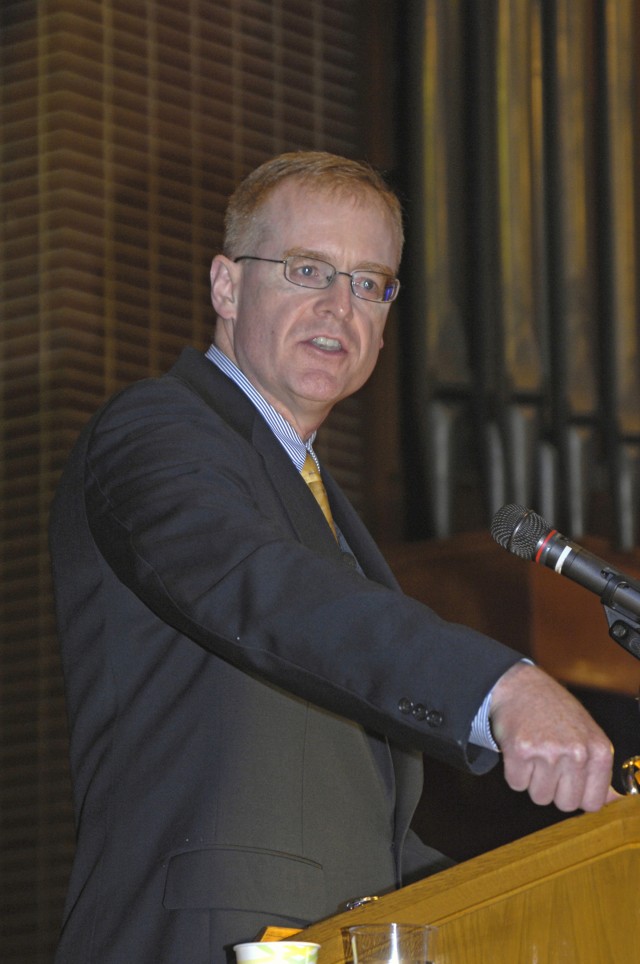Fort Dix, NJ, Sept. 27, 2009 - "Earlier this year, I was informed that I had three more skin cancers on my ear and they were going to have to take my ear off," Chap. (Brig. Gen.) Eugene R. Woolridge, assistant chief of chaplains for mobilization and readiness, said during a sermon Sept. 27 at the Fort Dix Main Chapel. And they did.
Woolridge doesn't worry about the loss of his ear. What he cares about are the wounded Soldiers he visits with or the Family who has lost a Soldier. What he cares about is helping Soldiers grow through and beyond wounds.
A decorated Soldier, Woolridge resigned his commission as a captain to answer a call to serve God.
"I felt a strong calling to a local church where I knew God wanted me to be," he explained. "It was a calling from God. I think the most important thing is for you to be true to your calling; and most important is a divine calling. God has shaped me better to be a chaplain than an infantry officer."
Woolridge has degrees from the Military Academy at West Point and a master's degree in Strategic Studies from the Army War College in Carlisle, Pa. After resigning his commission, he graduated from the Southwestern Baptist Theological Seminary, Fort Worth, Texas in 1992. He then founded a Southern Baptist church in Powder Springs, Ga., and worked as its pastor for 10 years.
But he never gave up the military. Having stayed in the Army Reserve, Woolridge was commissioned an Army Reserve chaplain in January 1994 and continued serving his country. As an active duty officer, Woolridge was a Ranger, a platoon leader, an adjutant, a supply officer, and an antitank company commander in Germany and Fort Carson, Colo. During his Reserve career he has served not only as a chaplain, but as a rear area security officer and adjutant of the 607th Military Police Battalion, Fort Worth.
Having twice served Operation Enduring Freedom in Kuwait and in Afghanistan, Woolridge has been where the Soldiers he cares so much about have been. Woolridge's wife Deborah accompanied him on a recent trip to Hawaii. She visited wounded Soldiers with him, talking with them, comforting them and offering them knowledge that their sacrifice was appreciated.
"I don't think the nation understands the sacrifice of our Soldiers and the chaplains and their assistants," Woolridge said following a service he conducted at the chapel. "Think of the chaplains at Dover. They are meeting Soldiers coming off the planes and greeting the families making visitations to their loved ones' remains. It just rips your heart out, Soldiers families greeting caskets coming off the plane."
Citing a Soldier he has recently counseled, Woolridge said the Soldier felt guilty because he has deployed only once, but the Soldier has buddies who have deployed several times. He volunteered and is heading back to Iraq in November.
"Soldiers are now deploying more often and earlier. Units have deployed multiple times. They are very tired. They need time to reset. It is the responsibility of the chaplaincy to help them. We tell them to take a knee, take a rest, restore resiliency," he explained.
Soldiers have spiritual needs and need spiritual support, Woolridge explained. "This has been historically recognized and always has been since the beginning of the Army. The chaplaincy has changed over time, adapting to operational force and reserve needs," he said.
"We have an Army that really tends its wounded, but we have chaplains who are wounded also. In a time of persistent conflict, it is not a time when you defeat the enemy or they surrender and it's over. You have to reset the chaplain corps and the Reserves have a big role in that," he said.
That is why Woolridge spent a year with First Army in Atlanta helping chaplains prepare for mobilization. Chaplains must have resilience to ensure they are available to Soldiers. As the conflict draws on, possibly for years, Woolridge explained, Chaplains must be able to draw on their beliefs and share belief with their charges.
His career as assistant chief of chaplains for mobilization and readiness means that he visits many posts across the nation and beyond. Working part-time, he spends approximately 100 days a year with his duties, most of them traveling. The major difference he has noted in his travels is the professionalism of all of the forces.
"It is really hard to tell the difference between Reserve, National Guard, and active duty now," Woolridge explained. "All of our uniformed services are totally professional. The Reserve and National Guard are a little older, but they meet the same standards; that used to be different.
"The professionalism of the Reserve and National Guard is much higher now. What I notice with all of them is selfless service, one of the Army Values. We've had people who are voluntarily walking away from their own pursuits to serve their country and do it at great personal cost. The costs are lives or limbs or they come back forever changed."
The Army is doing everything it can to help them grow through the trauma, he said. The most important idea Woolridge wants to help wounded Soldiers understand is not to see their injuries, internal or external, as a disorder. Woolridge wants them to see everything as an opportunity for post-traumatic growth.
"We have a generation of people who have been wounded, some visible and some not. We must help them grow. They have served the nation, and that service has been tragic. As chaplains, we are here to say there is a spiritual answer," Woolridge tells Soldiers.


Social Sharing